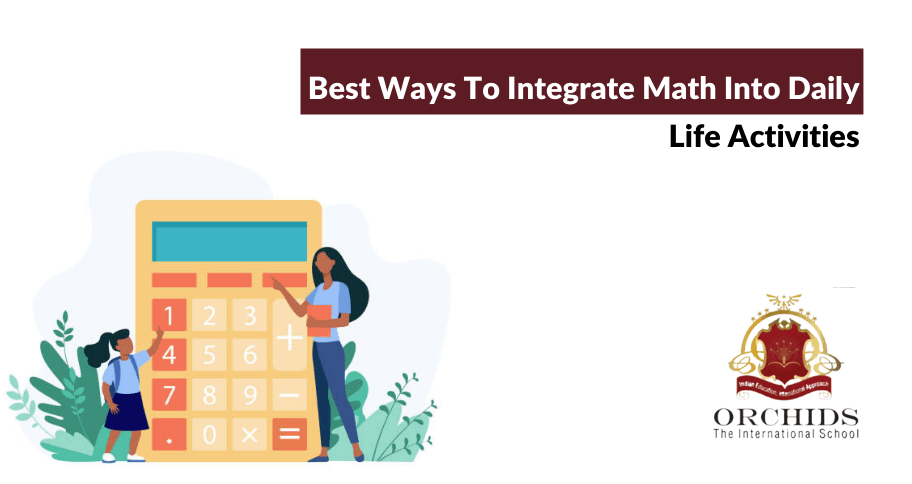The best way to integrate math into the daily life activities
By Mautushi Paul |
Date 05-09-2023

Table of Contents
Admissions Open for
Introduction
There can be math in anything you do daily, from sweeping the floor to cooking meals. When your child does math with math problems in real-world situations, they are more likely to have an easier time understanding math concepts later on in life than math in daily life activities problems that only deal with numbers and not objects or people around them.
10 maths activities for children
1. Doing Chores With Your Child
All of the chores around the house should count as math activities! If you want your child doing their fair share of chores throughout your home, have them participate by adding up all of their numbers as they go along. This way, they’re practising math in daily life activities without really feeling like it is practice because they’re enjoying what they’re doing at that moment.
2. Making Shopping Lists
Bring your child with you during your next trip to the grocery store! Remember how math is everywhere in every real-world situation? Well, math in daily life activities is at the grocery store too! Make a list while you’re there and ask your child what they think the total should be when you get up to the register. Asking them math questions while shopping will make math feel like an everyday activity instead of something that only happens at school or during homework time.
3. Ending The Night With Math Quizzes
Before bedtime, try giving your child math quizzes using math in daily life activities problems about something that happened throughout their day. This will help them see math in action throughout their day without making math come up in everyday activities.
4. Play With Money!
Dinosaurs or princesses? Cupcakes or cookies? Ask your child how much money it would cost to buy the items they want. This may make math in daily life activities feel like a game, instead of an assignment they dread doing at night before bedtime.
5. Technology Is Your Friend
There are so many math in daily life activities games online that your child can play that help them learn their math facts while having fun at the same time! Websites such as mathplayground.com offer math games for kids of all skill levels and abilities. If you’re not sure where to start looking for invitations to play, look on your child’s favourite website, whether it be princesses, cupcakes, or soccer.
Providing the kids with a curriculum that is interesting is another way of helping them succeed in maths and improve their academic performance. Orchids’ NCERT solutions of Maths Magic Grade 1 is one such curriculum that can help provide a better study environment to every child. NCERT helps children develop a strong conceptual foundation, which is vital during their formative years in school. The section-wise NCERT solutions for grade 4 are available in PDF format for free download. These solutions are easy to use even when they are not connected to the internet.
Our team of academic specialists has created NCERT solutions for the Maths Magic Grade 1 syllabus in compliance with CBSE norms. Students can not only gain a better understanding of the subject but also improve their exam scores by using the NCERT solutions provided.
6. Making Connections
Making maths more relevant to your child can make math homework a bit more bearable for you both. Involving math in the things your child is interested in will teach them how math in daily life activities is everywhere and why it’s important to know math facts! For example, if they learn about zoo animals, ask them how many tigers are at the zoo. Asking questions that connect math to their daily lives can help them understand its importance. Just asking one simple question can increase their awareness of the world around them and instil a deeper interest in math! Ask these types of math questions frequently during the day as part of the conversation with your child.
7. Try using fun activities at home
Beyond math facts, math games are great for making math more enjoyable. Many math in daily life activities games can be found online or purchase math-based video games to help them learn math facts in a fun way. Fun books that allow your child to practice math facts are also available, like math storybooks and comics. Involving your kids with fun math activities at home will give them the tools they need to succeed when you ask them their favourite math questions!
8. Practise maths in daily life with them
Your math child will be more sensitive and aware of math if you practice math facts with them. He/she may get help from their friends or family members to solve math in daily life activities problems, but parents need to take time and teach lessons on math facts at home to ensure they fully understand their subject.
9. Focus on the importance of math facts practice
The habits of doing math facts are different from practicing spelling tests or history quizzes. In addition to giving math exams every month, parents need to ensure their child practices math facts daily, especially since we know how smart these children are! If you want your child to gain successful learning, your math child will be more sensitive and aware of math if you practice math in daily life activities facts. They may get help from their friends or family members to solve math problems, but parents need to take time and teach lessons on math facts at home to ensure they fully understand their subject.
Conclusion
Math in daily life activities is a difficult subject to teach our children. Even math experts have a math phobia. If you are one of those parents who thinks math is complex, here are a few tips for helping your child learn math skills while having fun! With such a vast array of math games and activities available, you should have no problem finding one your kids will enjoy. If not, it’s easy enough to create your fun math games or activities to keep the little ones entertained! Follow these 8 tips, and you’ll find math becomes much more accessible than before!
You can also read
How to improve the maths of my child?
Educational activities for Kids on International education day
Robotics- The Intersection of Science and Technology in School Education
CBSE Schools In Popular Cities
- CBSE Schools in Bangalore
- CBSE Schools in Mumbai
- CBSE Schools in Pune
- CBSE Schools in Hyderabad
- CBSE Schools in Chennai
- CBSE Schools in Gurgaon
- CBSE Schools in Kolkata
- CBSE Schools in Indore
- CBSE Schools in Sonipat
- CBSE Schools in Delhi
- CBSE Schools in Rohtak
- CBSE Schools in Bhopal
- CBSE Schools in Aurangabad
- CBSE Schools in Jabalpur
- CBSE Schools in Jaipur
- CBSE Schools in Jodhpur
- CBSE Schools in Nagpur
- CBSE Schools in Ahmednagar
- CBSE School In Tumkur

Call Us to know more about Orchids
Swipe Up
















